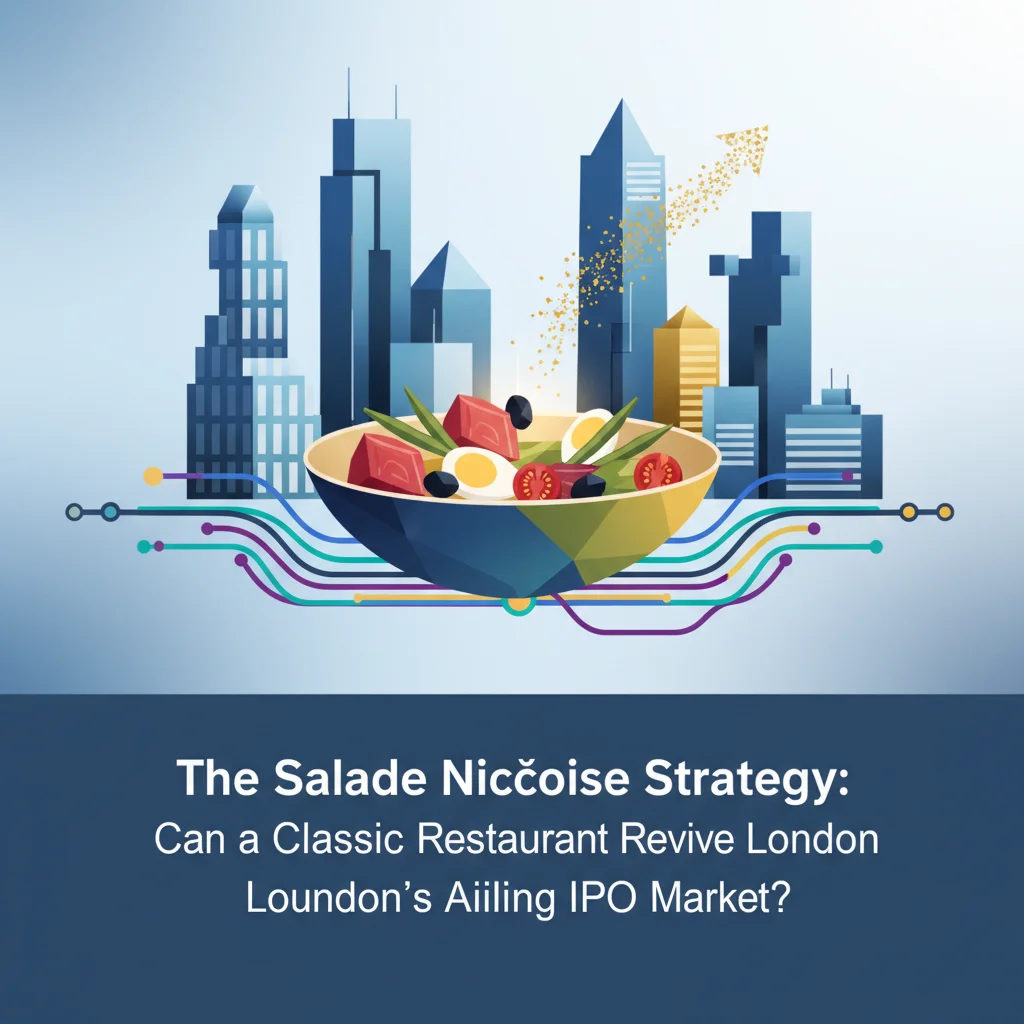
The Salade Niçoise Strategy: Can a Classic Restaurant Revive London’s Ailing IPO Market?
In the fast-paced world of modern finance, investor attention is a fleeting commodity. One moment, the market is captivated by the meteoric rise of crypto exchanges built on complex blockchain technology; the next, it’s all about the insatiable demand for data centres powering the AI revolution. These trends, while exciting, often burn bright and fast. But amidst this whirlwind of technological disruption, a different kind of investment story is quietly unfolding in London—one that suggests that in the long run, substance may just trump speculation. As the Financial Times aptly put it, “salade niçoise is forever.”
This sentiment perfectly captures the impending Initial Public Offering (IPO) of The Wolseley Hospitality Group, the esteemed operator of some of London’s most iconic dining establishments. As the group prepares to list on the London Stock Exchange’s AIM market, its arrival poses a critical question for the UK’s financial ecosystem: In an era dominated by fintech and disruptive tech, is there still an appetite for traditional, tangible, and profitable businesses? The answer could have profound implications not just for investors, but for the future of London as a global financial hub.
London’s IPO Pond: Shallow Waters and a Thirst for New Listings
To understand the significance of The Wolseley’s public debut, one must first appreciate the challenging environment in which it’s happening. The London Stock Exchange, once the undisputed heavyweight champion of European finance, has been struggling. The pipeline for new IPOs has been worryingly dry, and the market has been plagued by a series of high-profile companies either delisting or choosing to list elsewhere, most notably New York.
The departure of British chip designer Arm Holdings, which opted for a blockbuster Nasdaq listing over its home market, was a particularly symbolic blow. This “listing gap” has sparked a national conversation about how to rejuvenate the UK’s capital markets and make them more attractive for ambitious companies. The prevailing wisdom often points towards attracting more high-growth technology and financial technology firms to compete with the US. But perhaps the answer, or at least part of it, lies in a different direction entirely.
The Wolseley’s IPO, while modest in size, represents a powerful counter-narrative. It’s a vote of confidence in the London market from a quintessentially British brand built on service, quality, and consistency—qualities that resonate deeply in the world of long-term investing.
The Maverick and the Megabank: Inside the Landmark Deal Redefining Japanese Finance
A Closer Look at the Main Course: The Wolseley’s Financials
The Wolseley Hospitality Group isn’t a speculative, “jam tomorrow” tech start-up. It is an established, revenue-generating business with a clear path to profitability and growth. The company plans to raise between £20 million and £30 million through its listing on AIM, targeting a valuation of around £100 million. These funds are earmarked for expansion, with plans to open new locations in London and even New York.
Let’s examine the key financial ingredients that make this offering compelling for a certain class of investor.
| Metric | Details |
|---|---|
| IPO Target | £20mn – £30mn on the AIM market |
| Target Valuation | Approximately £100mn |
| Recent Performance | Reported a pre-tax profit of £1.9mn on £54mn in revenue in its last fiscal year (source) |
| Business Model | Operator of high-end, iconic London restaurants including The Wolseley and The Delaunay |
| Use of Proceeds | Funding domestic and international expansion |
These numbers paint a picture of a stable and mature business. Unlike many tech IPOs that are valued on future potential and user growth metrics, The Wolseley is being valued on tangible assets, existing cash flow, and a proven track record. This is a classic “value” proposition in a market often obsessed with “growth.”
The “Boring” is Beautiful: Why Stability is the New Disruption
In the lexicon of modern investing, “boring” can be a four-letter word. But for a growing number of market participants, it’s becoming a badge of honor. The investment thesis behind a company like The Wolseley is rooted in the economics of enduring brands.
While a new blockchain protocol might become obsolete in five years, the appeal of a beautifully prepared meal in an elegant setting is timeless. This offers a level of predictability that is rare in the high-stakes world of technology and fintech trading. Here’s why this seemingly “old-fashioned” investment holds modern appeal:
- Brand Equity: The Wolseley isn’t just a restaurant; it’s a cultural institution. This powerful brand creates a defensive moat, commanding customer loyalty and pricing power that is difficult for competitors to replicate.
- Tangible Assets: The company’s value is tied to physical locations, long-term leases, and real-world operations, providing a degree of asset-backed security that is absent in many digital-first businesses.
- Predictable Revenue Streams: While subject to economic cycles, revenue from a well-run restaurant group is far more predictable than that of a pre-profit tech company dependent on future product adoption or advertising models.
- Inflation Hedge: As a consumer-facing business, the hospitality sector often has the ability to pass on rising costs to customers, making it a potential hedge in an inflationary environment—a key concern in today’s economy.
This IPO challenges the narrative that the only way for the London stock market to thrive is by chasing the next big tech unicorn. It suggests that a healthy, diverse financial ecosystem needs a mix of companies, including those that provide stability and consistent, if not explosive, returns.
The Silver Surge: Why This "Other" Precious Metal is Reclaiming Its Throne
A Story of Resilience: From Boardroom Battles to Public Markets
The journey of The Wolseley to the public market has been anything but smooth, adding a layer of drama and resilience to its story. The group was formerly known as Corbin & King, led by celebrated restaurateurs Chris Corbin and Jeremy King. A well-publicized and acrimonious battle for control with its majority shareholder, the Thai hotel group Minor International, resulted in the company entering administration before Minor ultimately acquired full ownership (source).
While boardroom drama is often a red flag for investors, in this case, the company’s ability to navigate such a tumultuous period and emerge profitable and focused on growth can be seen as a testament to the underlying strength of its brands and operations. The new leadership, under CEO Dylan Barfield, has stabilized the ship and is now charting a course for expansion, proving that the magic of its restaurants transcends any single personality.
Implications for the UK Economy and the Thoughtful Investor
The success or failure of The Wolseley’s IPO will be watched closely. A successful listing would send a powerful message: London is open for business for all types of quality companies, not just those in technology or banking. It could encourage other established, profitable, and privately-owned British businesses in sectors like retail, manufacturing, and hospitality to consider a public listing, thereby deepening the pool of investment opportunities and strengthening the UK stock market.
For investors, this presents an opportunity to rethink portfolio construction. While exposure to high-growth sectors is important, balancing it with stable, cash-generative businesses can reduce overall volatility and provide a more resilient foundation for long-term wealth creation. The Wolseley’s IPO is a reminder that the principles of sound investing—backing strong brands, proven business models, and competent management—never go out of style.
In the end, the financial markets are a complex ecosystem. They need the soaring eagles of disruptive technology, but they also need the steady, reliable anchors of established industry. As The Wolseley Hospitality Group prepares to serve up its shares to the public, it offers a refreshing and perhaps necessary alternative—a reminder that in the search for returns, sometimes the most satisfying investment is one built on a foundation as solid and timeless as a classic salade niçoise.
The Isle of Man's 9.9% Wage Hike: A Microcosm of Global Economic Tensions


